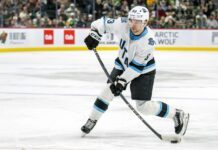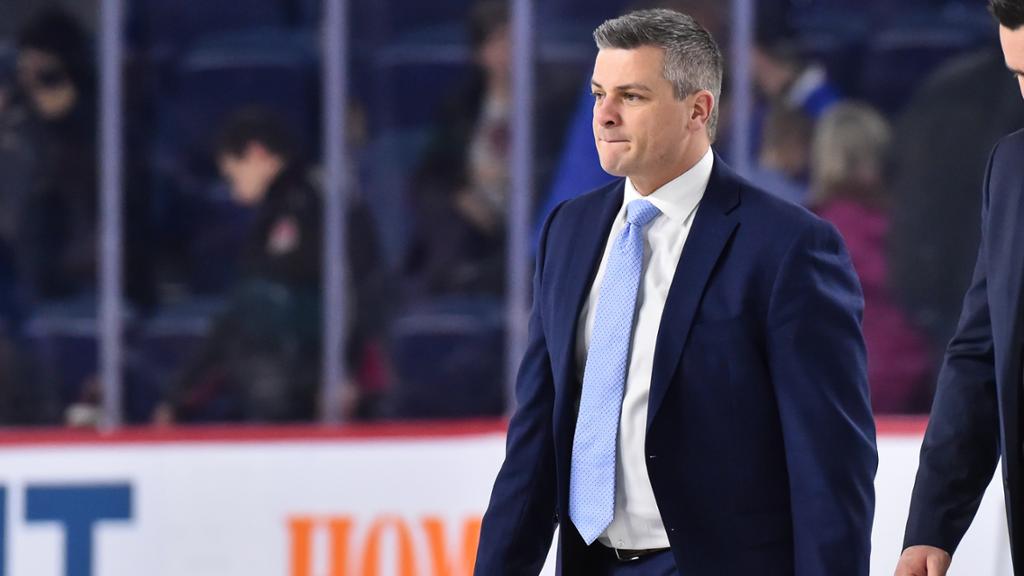It doesn’t feel like Sheldon Keefe has been head coach of the Toronto Maple Leafs for two seasons on account of the fact that he hasn’t really been — he took over the head coaching job a month and a half into the 2019-20 season, which was was then truncated by Covid in March 2020, before the abbreviated 2020-21 campaign kicked off last January.
Those circumstances leave Keefe with just 103 games coached in the NHL over two years and are perhaps why it was an understated storyline that it appeared he was going to enter the lame-duck year of his three-year contract signed back in November of 2019.
That’s not going to be the case, as Keefe has been afforded the security of a new two-year contract extension over the summer.
Sources say Toronto Maple Leafs head coach Sheldon Keefe has agreed to a 2-year extension. He was entering the final year of his deal. Signed through 23-24 now. More details on Insider Trading shortly on Sportscentre. @TSNHockey @TheAthletic
— Pierre LeBrun (@PierreVLeBrun) September 30, 2021
Whatever you think of the job Keefe has done and whether he’s likely to last beyond 2021-22, it is fairly standard, especially knowing the distraction it creates in this market, not to leave a coach in a position where he is coaching for his job with no contractual security beyond the end of the season. It also isn’t lost on players in the room when their coach isn’t signed beyond the end of the year.
Many Leafs fans will recall the infamous Ron Wilson contract extension announcement on Christmas Day of 2011 only for Wilson to be fired exactly 68 days later.
A few years later in 2014, Wilson’s successor, Randy Carlyle, made it just 40 games into his two-year contract extension.
Of course, Keefe’s regular-reason record easily eclipses that of either of those two predecessors or even the man he replaced directly in Mike Babcock. The team is in a much different place than it was early in Babcock’s tenure, but the 63-29-12 record Keefe has amassed is the best winning percentage in franchise history for any coach at the 100-game mark.
There are a couple of significant caveats, most notably that more than half of those games were played against a six-team league largely comprised of mediocre opposition (aka the Canadian Division) in 2020-21.
That said, despite dealing with turbulent schedules due to Covid (resulting in abbreviated training camps), in the regular season, Keefe has largely maintained the strong goal-scoring output of the offensively-skilled team he inherited while making significant inroads with the team’s defensive play last season to the point where the Leafs were top 10 across most of the major statistical categories, both offensive and defensive. Personnel-wise, it has to be noted that he was equipped with the best unit of six defensemen the organization has assembled in decades, but the buy-in and structure to the team’s 5v5 defensive game was noticeably improved, albeit against mediocre opposition in 2020-21.
In the postseason, however, the team’s offense has dried up at critical times when the game tightens up, substantial leads have been squandered, “mental fragility” has become Keefe’s go-to descriptor of his team’s seemingly tragic flaw, and the Leafs head coach has arguably been out-coached by two rival bench bosses in charge of clearly less-talented rosters. Decisions such as suddenly moving Nylander to center and creating a newfangled “super line” for the series-deciding Game 5 vs. Columbus, yo-yoing Travis Dermott and Rasmus Sandin (to bad results) throughout the Montreal series, over-reliance on a few key contributors up front to the detriment of the team’s depth, Matthews & Marner’s ice time vs. Nylander’s ice time, and worst of all, the inexcusably awful power play suggest that — just as his star players have disappeared on him in the big moments so far — Keefe’s calls from behind the bench have left something to be desired at the most critical time of the year.
That said, we certainly have a lot less to go on than we normally would with coaches two years into their tenure due to circumstances outside of Keefe’s control, and we will find out a lot more about Keefe as a coach over the 82-game season (and the Amazon Prime series) that is upcoming — his first full training camp and NHL season as bench boss of the team or in the league. The Leafs are entering a taxing season not just in terms of strength of competition in the Atlantic Division but also in regards to the psychological challenges created by the fallout from the most disappointing playoff outcome imaginable last May. It is one that has left the regular season feeling like an afterthought from the outsider’s perspective, with even a President’s Trophy-winning performance meaning precious little unless/until the team delivers in the proving ground of the postseason.
That doesn’t make it any less important for the team to focus on cementing a strong position and home-ice advantage in the regular-season standings, further build on last season’s defensive results, generate more chances and goals from in tight to the net, and improve the team’s overall depth up front despite the loss of Zach Hyman, all while managing a new 1A/1B goaltending tandem under the microscope of the Toronto market.
Keefe has theoretically been equipped with more versatility and net-front scoring options up front in the new additions available to him this season compared to last year (Bunting, Kampf, Ritchie, Kase), but it’s up to him to put together an effective puzzle outside of his big four forwards. Within Keefe’s puck-possession style of game, can the team find the right balance of risk-reward in its game within the constraints of tight-checking playoff hockey? Can Keefe and his staff prevent the power play from becoming painfully predictable and fading down the stretch into the playoffs? Is he able to make the right adjustments when injuries inevitably strike, particularly if they impact his big-four forward group again this year? The margins should those challenges arise, due to the nature of the team’s roster/cap construction, aren’t as forgiving as they may be in other markets around the league.
Keefe earned the reputation of being a highly prepared, creative, adaptable coach who has achieved significant things at lower levels of the game. Simply playing the tar out of Matthews and Marner — with a lack of ideas once the two went cold, and a shortage of defined roles/ identities on his depth lines — did not show much of either of the latter traits in the postseason last year. But we have seen clear signs of the potential under Keefe for this Leafs team to play entertaining, skilled, high-scoring, puck-possession, defensively-sound, winning hockey.
The excuse (however legitimate) of strange, fan-less, abbreviated seasons no longer flies in 2021-22, and nothing short of a deep run in 2022 is expected from Sheldon Keefe in a pivotal season for both the franchise and his NHL coaching career.































